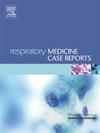High-frequency jet ventilation in managing airway during whole-lung lavage under general anesthesia: A case report
IF 0.7
Q4 RESPIRATORY SYSTEM
引用次数: 0
Abstract
Pulmonary alveolar proteinosis (PAP) is a rare disorder characterized by the accumulation of surfactant-derived lipoproteins within alveoli and impaired macrophage function, leading to progressive dyspnea, hypoxemic respiratory failure, secondary infections, and pulmonary fibrosis. We report a case of a 43-year-old male with a history of occupational exposure to airborne dust from lathe work, presenting with exertional dyspnea. High-resolution computed tomography (HRCT) revealed bilateral patchy ground-glass opacities with interlobular septal thickening. Histopathological analysis of lung biopsy specimens showed eosinophilic amorphous material in alveolar spaces, which exhibited positive periodic acid-Schiff (PAS) staining with diastase resistance, confirming PAP. The patient underwent whole-lung lavage (WLL) of the right lung under general anesthesia. Severe baseline hypoxemia complicated intraoperative oxygen saturation maintenance. The intermittent use of high-frequency jet ventilation (HFJV) in the operative lung markedly improved oxygenation (SpO2 increased from 85 % to 96 %) while ensuring effective saline distribution into distal alveoli. The procedure was completed without complications, highlighting the efficacy and safety of HFJV in managing complex airway conditions during WLL for PAP.
高频喷射通气在全麻全肺灌洗气道管理中的应用:1例报告
肺泡蛋白沉积症(PAP)是一种罕见的疾病,其特征是肺泡内表面活性剂来源的脂蛋白积累和巨噬细胞功能受损,导致进行性呼吸困难、低氧性呼吸衰竭、继发性感染和肺纤维化。我们报告一例43岁的男性与历史的职业暴露于空气中的灰尘从车床工作,表现出呼吸困难。高分辨率计算机断层扫描(HRCT)显示双侧斑片状磨玻璃影伴小叶间隔增厚。肺活检标本的组织病理学分析显示肺泡间隙嗜酸性无定形物质,周期性酸希夫(PAS)染色阳性,伴有淀粉酶抗性,证实PAP。患者在全身麻醉下行右肺全肺灌洗术。严重基线低氧血症并发术中氧饱和度维持。在手术肺中间歇性使用高频喷射通气(HFJV)可显著改善氧合(SpO2从85%增加到96%),同时确保生理盐水有效分布到远端肺泡。该手术无并发症完成,突出了HFJV在PAP患者WLL期间处理复杂气道状况的有效性和安全性。
本文章由计算机程序翻译,如有差异,请以英文原文为准。
求助全文
约1分钟内获得全文
求助全文
来源期刊

Respiratory Medicine Case Reports
RESPIRATORY SYSTEM-
CiteScore
2.10
自引率
0.00%
发文量
213
审稿时长
87 days
 求助内容:
求助内容: 应助结果提醒方式:
应助结果提醒方式:


